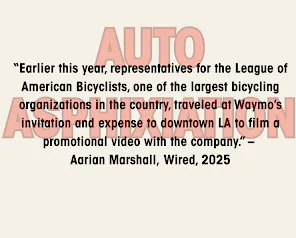This week, the Trump administration froze $18 billion in federal funding for two of the country’s most critical infrastructure projects: the Hudson River Gateway Tunnel and the Second Avenue Subway extension. The stated justification—that the projects were “based on unconstitutional DEI principles”—is a pretext. This move is a retaliatory strike against a vision of urbanism that centers people, climate, and community.
The decision has little to do with fiscal responsibility, coming from an administration that amassed a staggering deficit in its first five months. It is, instead, a cultural broadside. It pathologizes public transit and bicycling as symbols of ideological excess and punishes cities for building infrastructure that connects people across culture, class, and geography. Ultimately, it undermines the very systems that make urban life possible for everyone.
In the United States, car ownership is often framed as a marker of success, while transit and bicycling are stigmatized as fallback options. This framing is not only inaccurate; it is dangerous. Public transit and active transportation are cornerstones of economic vitality, climate resilience, and social cohesion.
New York City’s transit system, the backbone of the regional economy, carries over 3 million riders on a typical weekday.
- NJ Transit alone generates $12.7 to $13.8 billion in annual economic value statewide.
- The Hudson Tunnel Project supports 95,000 jobs and $19.6 billion in economic activity over its construction period.
- The Second Avenue Subway extension will restore transit access to East Harlem for the first time in 75 years, serving 300,000 daily riders.
These are not fringe projects. They are lifelines for workers, families, students, and seniors.
The climate crisis makes this infrastructure more urgent than ever. Transportation is the largest source of carbon emissions in the United States, and public transit and bicycling are among our most effective tools for change.
- Switching from a car to a bike just once a day reduces an individual’s transportation emissions by 67 percent.
- Public transit emits 55 percent less CO₂ per passenger mile than a private vehicle.
- Each new mile of bike lane can generate 13,400 miles of bicycle travel annually, reducing emissions and improving public health.
These benefits are universal. The climate crisis does not respect borders or identities; it is a shared vulnerability that will impact white middle-class men and their families, just as it already devastates historically excluded communities who bear the brunt of environmental harm. We are all in this together, and our infrastructure must reflect that collective reality.
The administration’s claim that DEI principles are “unconstitutional” is a political maneuver, not a legal finding. In infrastructure, DEI means ensuring that people of all identities—across cultural, gender, ability, income, and immigration status—have access to safe, dignified mobility. It is a commitment to correcting decades of systemic harm from redlining, disruptive highway construction, and chronic transit disinvestment. To attack DEI is to attack the principle that infrastructure should serve all of humanity, not just privilege.
This moment demands a clear-eyed defense of that principle. We must reject the flawed and opportunistic strategy that has, over time, simply swapped one narrow frame for another—from stigmatizing transit as a service for the poor to marketing it as a luxury for a specific, privileged subset of society. I have witnessed this 180-degree turn in bicycling advocacy, which now often frames its benefits primarily for white, middle-class children and families —all in the pursuit of funding. This strategy not only revives the exclusionary, ableist, and white supremacist roots of early advocacy but also ensures its failure by ignoring the communities most impacted by car-centric systems. In the end, it endangers us all. The climate crisis demands a narrative that moves beyond this framework—one that rejects both the pathologization of the marginalized and the centering of white comfort, and instead champions a vision of infrastructure for a shared future.
A more robust framework is found in feminist urbanism, which is not about exclusion but liberation. It is a practice for everyone, including white cisgender men. A message that centers hope, people, and the natural world, not what is appealing to funders. It calls for building cities that care for all peoples, all of nature, all journeys, and all futures—cities designed for interdependence rather than isolation.
Cities like New York, Newark, and Jersey City are global crossroads. Their transit systems are international in character, bringing together people from all walks of life. They are spaces of prosocial interaction, where strangers share space and stories. To defund these systems is to weaken our collective capacity to move, connect, and thrive.
We must also move beyond narratives that pathologize transit and bicycling as mere services for those who cannot afford a car. This framing has long been used to secure nonprofit grants but fails to advance the policy changes we need. Instead, we must recognize public transit and bicycles as signs of collective strength. They represent a society that values connection over isolation, sustainability over sprawl, and equity over exclusion.
Our task is clear: we must build cities that move people, not just cars. We must defend the infrastructure that makes urban life possible. And we must demand that our federal government stop sabotaging our shared future.






